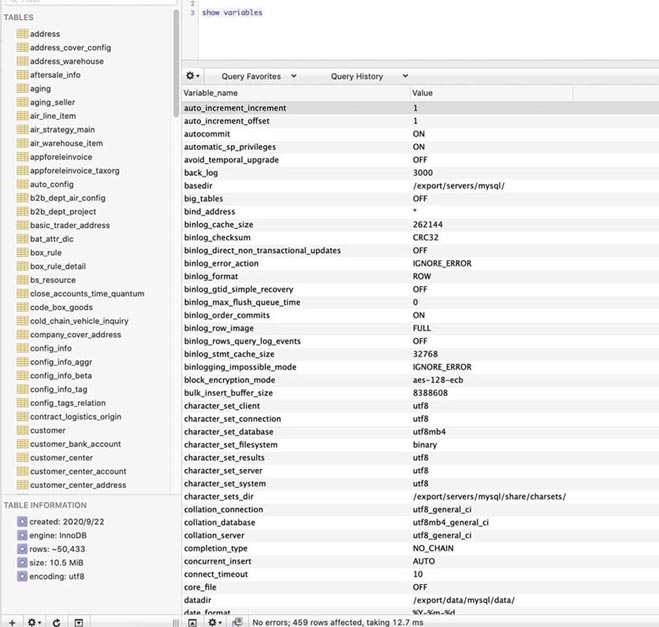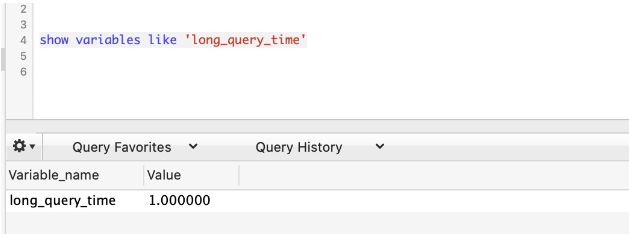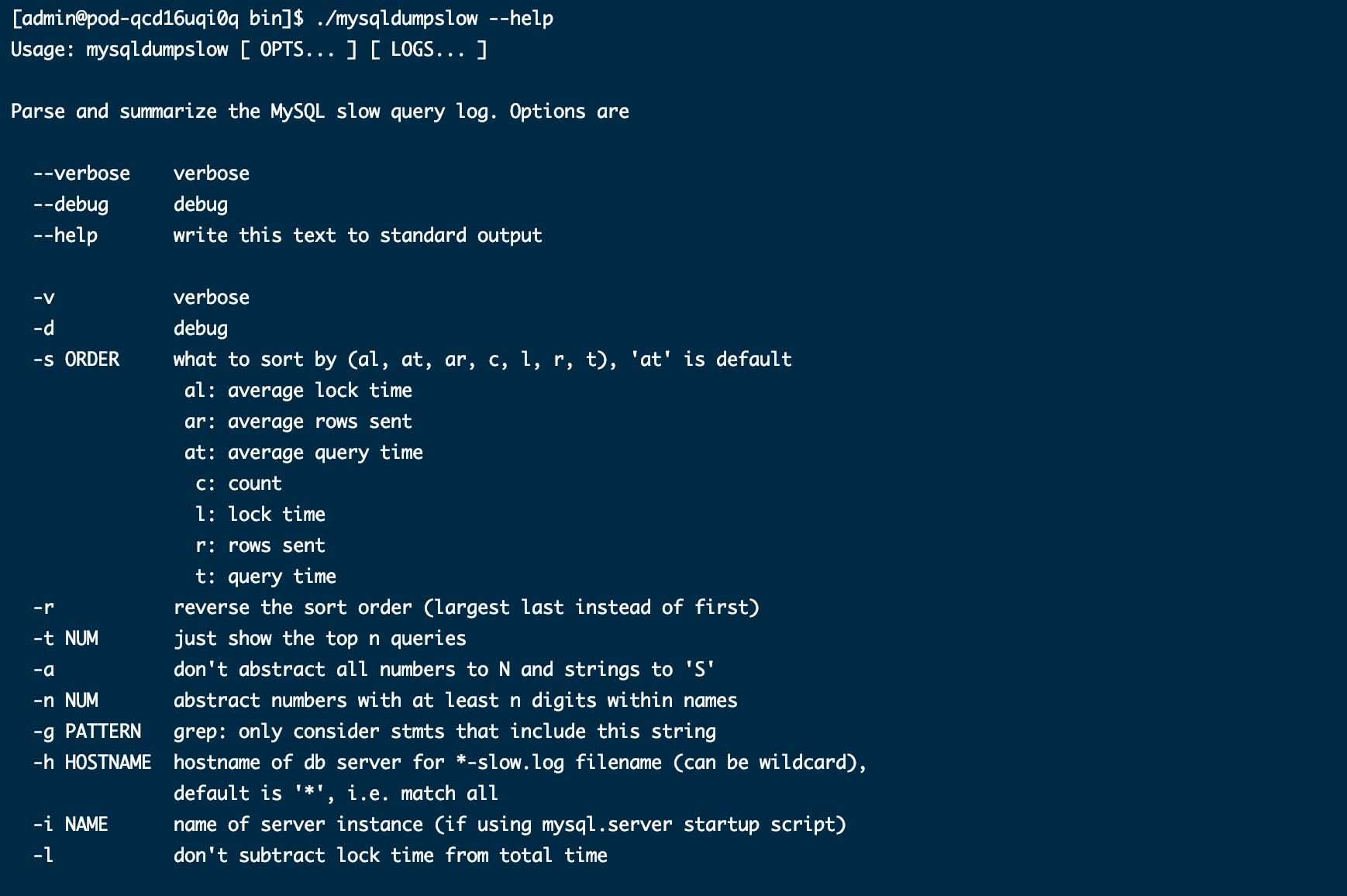What is the monitoring method of MySQL database?
There are many ways to monitor current databases, which are divided into three categories: built-in database, commercial, and open source. Each has its own characteristics;
As for the mysql database, because of its high Community activity and monitoring methods are diverse. No matter which monitoring method is used, the core is monitoring data. After obtaining comprehensive monitoring data, it is a flexible display part.
1. Number of connections (Connects)
1.1. Maximum number of used connections
show status like 'Max_used_connections';
1.2. Number of currently open connections
show status like 'Threads_connected';
2. Cache ( bufferCache)
2.1. Number of times not read from the buffer pool
show status like 'Innodb_buffer_pool_reads';
2.2. Number of times read from the buffer pool
show status like 'Innodb_buffer_pool_read_requests';
2.3. Total number of pages in the buffer pool
show status like 'Innodb_buffer_pool_pages_total';
2.4, Number of free pages in the buffer pool
show status like 'Innodb_buffer_pool_pages_free';
2.5, Cache hit rate calculation
(1-Innodb_buffer_pool_reads/Innodb_buffer_pool_read_requests)*100%
2.6, Cache pool usage rate
((Innodb_buffer_pool_pages_total-Innodb_buffer_pool_pages_free)/Innodb_buffer_pool_pages_total)*100%
3, Lock(lock)
Note: The number of lock waiting statistics is cumulative data. Each time it is obtained, it can be subtracted from the previous data to obtain the current statistical data
3.1. Lock waiting Number
show status like 'Innodb_row_lock_waits';
3.2. Average waiting time for each lock
show status like 'Innodb_row_lock_time_avg';
3.3. Check whether there is a table lock. If there is data, it means there is a lock table. If it is empty, it means there is no table lock
show open TABLES where in_use>0
4. Slow SQL
Note: When the mysqldumpslow command fails to execute, the slow log will be synchronized to the local for formatting.
4.1. Check whether the mysql slow sql switch is turned on
show variables like 'slow_query_log'; --ON 为开启状态,OFF 为关闭状态 set global slow_query_log=1 -- 可进行开启
4.2. Check the mysql slow sql threshold
show variables like 'long_query_time'; set global long_query_time=0.1 -- 根据页面传递阈值参数,修改阈值
4.3. Check the mysql slow sql directory
show variables like 'slow_query_log_file';
4.4. Format slow sql log
Note: This statement cannot be executed through jdbc and belongs to command line execution.
means: display the execution information of the 10 longest SQL statements. 10 can be modified to the TOP number. The information displayed is: number of executions, average execution time, SQL statement
mysqldumpslow -s at -t 10 /export/data/mysql/log/slow.log
5, statement
5.1, insert number
show status like 'Com_insert';
5.2, delete number
show status like 'Com_delete';
5.3, update quantity
show status like 'Com_update';
5.4, select quantity
show status like 'Com_select';
6, throughput (Database throughputs)
6.1, send throughput
show status like 'Bytes_sent';
6.2 , receiving throughput
show status like 'Bytes_received';
6.3, total throughput
Bytes_sent+Bytes_received
7, database parameters (serverconfig)
7.1, show variables

8. Slow SQL troubleshooting steps
Slow SQL refers to MySQL slow query, specifically refers to SQL whose running time exceeds the long_query_time value.
We often hear that MySQL has binary log binlog, relay log relaylog, redo rollback log redolog, undolog, etc. For slow queries, there is also a slow query log, slowlog, which is used to record statements whose response time exceeds the threshold in MySQL. Slow SQL has a fatal impact on actual production business. Therefore, it is particularly important for testers to monitor the execution of database SQL statements during the performance test process and provide accurate performance optimization suggestions for development. Then how to use the slow query log provided by the Mysql database to monitor the execution of SQL statements and find the SQL statements with higher consumption. The following is a detailed description of the steps to use the slow query log:
8.1. Make sure the slow SQL switch slow_query_log is turned on.

8.2. Set the slow SQL domain value long_query_time
This long_query_time is used to define how many seconds slower is considered a "slow query". Note that the unit is Seconds, I set the value of long_query_time to 1 by executing the sql command set long_query_time=1, that is, any query that takes more than 1 second to execute is considered a slow query, as follows:

8.3. Check the slow SQL log path


./mysqldumpslow -s c -t 10 /export/data/mysql/log/slow.log
./mysqldumpslow -s t -t 3 /export/data/mysql/log/slow.log
If: SELECT FROM sms_send WHERE service_id=10 GROUP BY content LIMIT 0, 1000;
mysqldumpslow command is executed and displayed:
Count: 2 Time=1.5s (3s) Lock=0.00s (0s) Rows=1000.0 (2000) , vgos_dba[vgos_dba]@[10.130.229.196]SELECT FROM sms_send WHERE service_id=N GROUP BY content LIMIT N, N
- Count: Indicates the number of execution times of this type of statement. The above figure indicates that the select statement has been executed 2 times.
- Time: Indicates the average execution time (total time) of this type of statement
- Lock: Lock time 0s.
Rows:单次返回的结果数是 1000 条记录,2 次总共返回 2000 条记录。
通过这个工具就可以查询出来哪些 sql 语句是慢 SQL,从而反馈研发进行优化,比如加索引,该应用的实现方式等。
8.5、常见慢 SQL 排查
8.5.1、不使用子查询
SELECT FROM t1 WHERE id (SELECT id FROM t2 WHERE name='hechunyang');
子查询在 MySQL5.5 版本里,内部执行计划器是这样执行的:先查外表再匹配内表,而不是先查内表 t2,当外表的数据很大时,查询速度会非常慢。
在 MariaDB10/MySQL5.6 版本里,采用 join 关联方式对其进行了优化,这条 SQL 会自动转换为
SELECT t1. FROM t1 JOIN t2 ON t1.id = t2.id;
但请注意的是:优化只针对 SELECT 有效,对 UPDATE/DELETE 子 查询无效, 生产环境尽量应避免使用子查询。
8.5.2、避免函数索引
SELECT FROM t WHERE YEAR(d) >= 2016;
由于 MySQL 不像 Oracle 那样⽀持函数索引,即使 d 字段有索引,也会直接全表扫描。
应改为 :
SELECT FROM t WHERE d >= ‘2016-01-01';
8.5.3、用 IN 来替换 OR 低效查询
慢
SELECT FROM t WHERE LOC_ID = 10 OR LOC_ID = 20 OR LOC_ID = 30;
高效查询
SELECT FROM t WHERE LOC_IN IN (10,20,30);
8.5.4、LIKE 双百分号无法使用到索引
SELECT FROM t WHERE name LIKE '%de%';
应改为 :
SELECT FROM t WHERE name LIKE 'de%';
8.5.5、分组统计可以禁止排序
SELECT goods_id,count() FROM t GROUP BY goods_id;
默认情况下,MySQL 对所有 GROUP BY col1,col2… 的字段进⾏排序。如果查询包括 GROUP BY,想要避免排序结果的消耗,则可以指定 ORDER BY NULL 禁止排序。
应改为 :
SELECT goods_id,count () FROM t GROUP BY goods_id ORDER BY NULL;
8.5.6、禁止不必要的 ORDER BY 排序
SELECT count(1) FROM user u LEFT JOIN user_info i ON u.id = i.user_id WHERE 1 = 1 ORDER BY u.create_time DESC;
应改为 :
SELECT count (1) FROM user u LEFT JOIN user_info i ON u.id = i.user_id;
The above is the detailed content of What is the monitoring method of MySQL database?. For more information, please follow other related articles on the PHP Chinese website!

Hot AI Tools

Undresser.AI Undress
AI-powered app for creating realistic nude photos

AI Clothes Remover
Online AI tool for removing clothes from photos.

Undress AI Tool
Undress images for free

Clothoff.io
AI clothes remover

Video Face Swap
Swap faces in any video effortlessly with our completely free AI face swap tool!

Hot Article

Hot Tools

Notepad++7.3.1
Easy-to-use and free code editor

SublimeText3 Chinese version
Chinese version, very easy to use

Zend Studio 13.0.1
Powerful PHP integrated development environment

Dreamweaver CS6
Visual web development tools

SublimeText3 Mac version
God-level code editing software (SublimeText3)

Hot Topics
 1670
1670
 14
14
 1428
1428
 52
52
 1329
1329
 25
25
 1274
1274
 29
29
 1256
1256
 24
24
 Laravel Introduction Example
Apr 18, 2025 pm 12:45 PM
Laravel Introduction Example
Apr 18, 2025 pm 12:45 PM
Laravel is a PHP framework for easy building of web applications. It provides a range of powerful features including: Installation: Install the Laravel CLI globally with Composer and create applications in the project directory. Routing: Define the relationship between the URL and the handler in routes/web.php. View: Create a view in resources/views to render the application's interface. Database Integration: Provides out-of-the-box integration with databases such as MySQL and uses migration to create and modify tables. Model and Controller: The model represents the database entity and the controller processes HTTP requests.
 MySQL and phpMyAdmin: Core Features and Functions
Apr 22, 2025 am 12:12 AM
MySQL and phpMyAdmin: Core Features and Functions
Apr 22, 2025 am 12:12 AM
MySQL and phpMyAdmin are powerful database management tools. 1) MySQL is used to create databases and tables, and to execute DML and SQL queries. 2) phpMyAdmin provides an intuitive interface for database management, table structure management, data operations and user permission management.
 MySQL vs. Other Programming Languages: A Comparison
Apr 19, 2025 am 12:22 AM
MySQL vs. Other Programming Languages: A Comparison
Apr 19, 2025 am 12:22 AM
Compared with other programming languages, MySQL is mainly used to store and manage data, while other languages such as Python, Java, and C are used for logical processing and application development. MySQL is known for its high performance, scalability and cross-platform support, suitable for data management needs, while other languages have advantages in their respective fields such as data analytics, enterprise applications, and system programming.
 Laravel framework installation method
Apr 18, 2025 pm 12:54 PM
Laravel framework installation method
Apr 18, 2025 pm 12:54 PM
Article summary: This article provides detailed step-by-step instructions to guide readers on how to easily install the Laravel framework. Laravel is a powerful PHP framework that speeds up the development process of web applications. This tutorial covers the installation process from system requirements to configuring databases and setting up routing. By following these steps, readers can quickly and efficiently lay a solid foundation for their Laravel project.
 Explain the purpose of foreign keys in MySQL.
Apr 25, 2025 am 12:17 AM
Explain the purpose of foreign keys in MySQL.
Apr 25, 2025 am 12:17 AM
In MySQL, the function of foreign keys is to establish the relationship between tables and ensure the consistency and integrity of the data. Foreign keys maintain the effectiveness of data through reference integrity checks and cascading operations. Pay attention to performance optimization and avoid common errors when using them.
 Compare and contrast MySQL and MariaDB.
Apr 26, 2025 am 12:08 AM
Compare and contrast MySQL and MariaDB.
Apr 26, 2025 am 12:08 AM
The main difference between MySQL and MariaDB is performance, functionality and license: 1. MySQL is developed by Oracle, and MariaDB is its fork. 2. MariaDB may perform better in high load environments. 3.MariaDB provides more storage engines and functions. 4.MySQL adopts a dual license, and MariaDB is completely open source. The existing infrastructure, performance requirements, functional requirements and license costs should be taken into account when choosing.
 What software is better for yi framework? Recommended software for yi framework
Apr 18, 2025 pm 11:03 PM
What software is better for yi framework? Recommended software for yi framework
Apr 18, 2025 pm 11:03 PM
Abstract of the first paragraph of the article: When choosing software to develop Yi framework applications, multiple factors need to be considered. While native mobile application development tools such as XCode and Android Studio can provide strong control and flexibility, cross-platform frameworks such as React Native and Flutter are becoming increasingly popular with the benefits of being able to deploy to multiple platforms at once. For developers new to mobile development, low-code or no-code platforms such as AppSheet and Glide can quickly and easily build applications. Additionally, cloud service providers such as AWS Amplify and Firebase provide comprehensive tools
 SQL vs. MySQL: Clarifying the Relationship Between the Two
Apr 24, 2025 am 12:02 AM
SQL vs. MySQL: Clarifying the Relationship Between the Two
Apr 24, 2025 am 12:02 AM
SQL is a standard language for managing relational databases, while MySQL is a database management system that uses SQL. SQL defines ways to interact with a database, including CRUD operations, while MySQL implements the SQL standard and provides additional features such as stored procedures and triggers.




